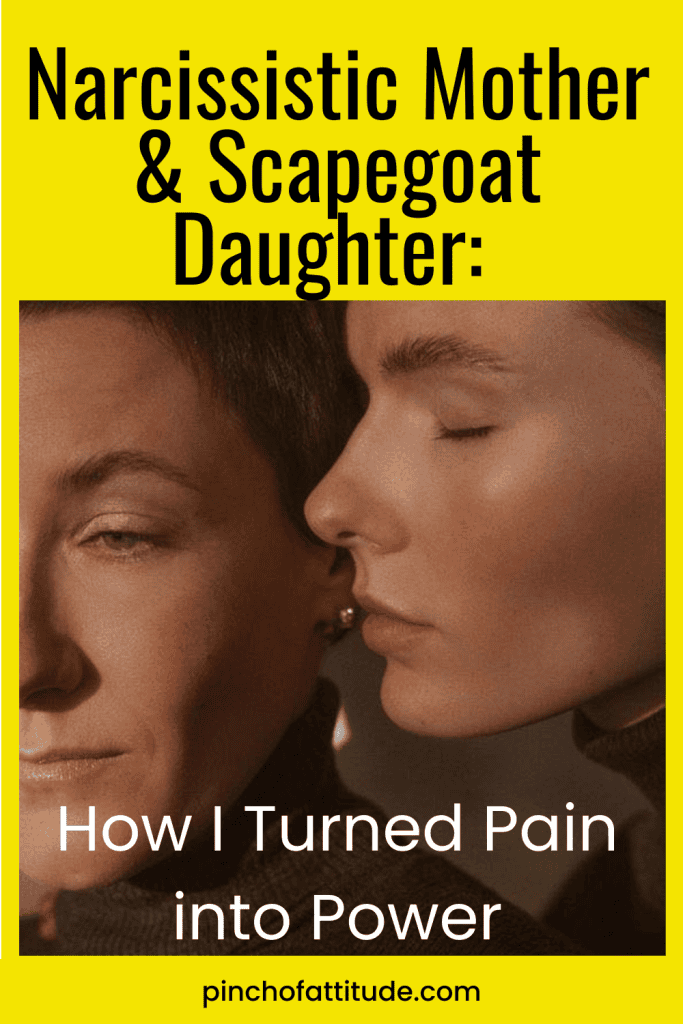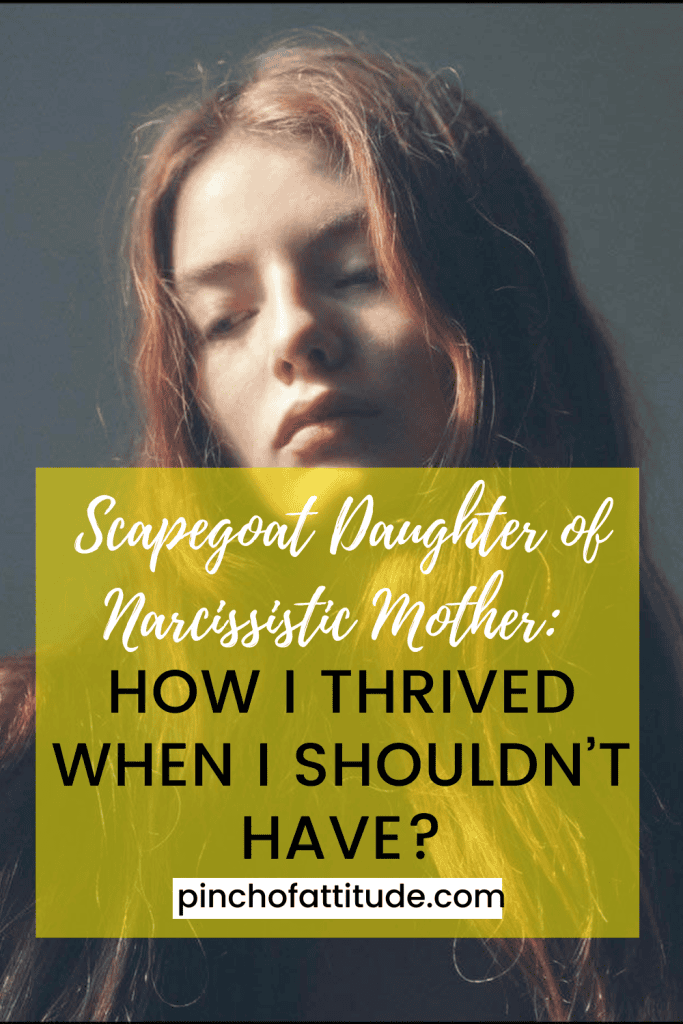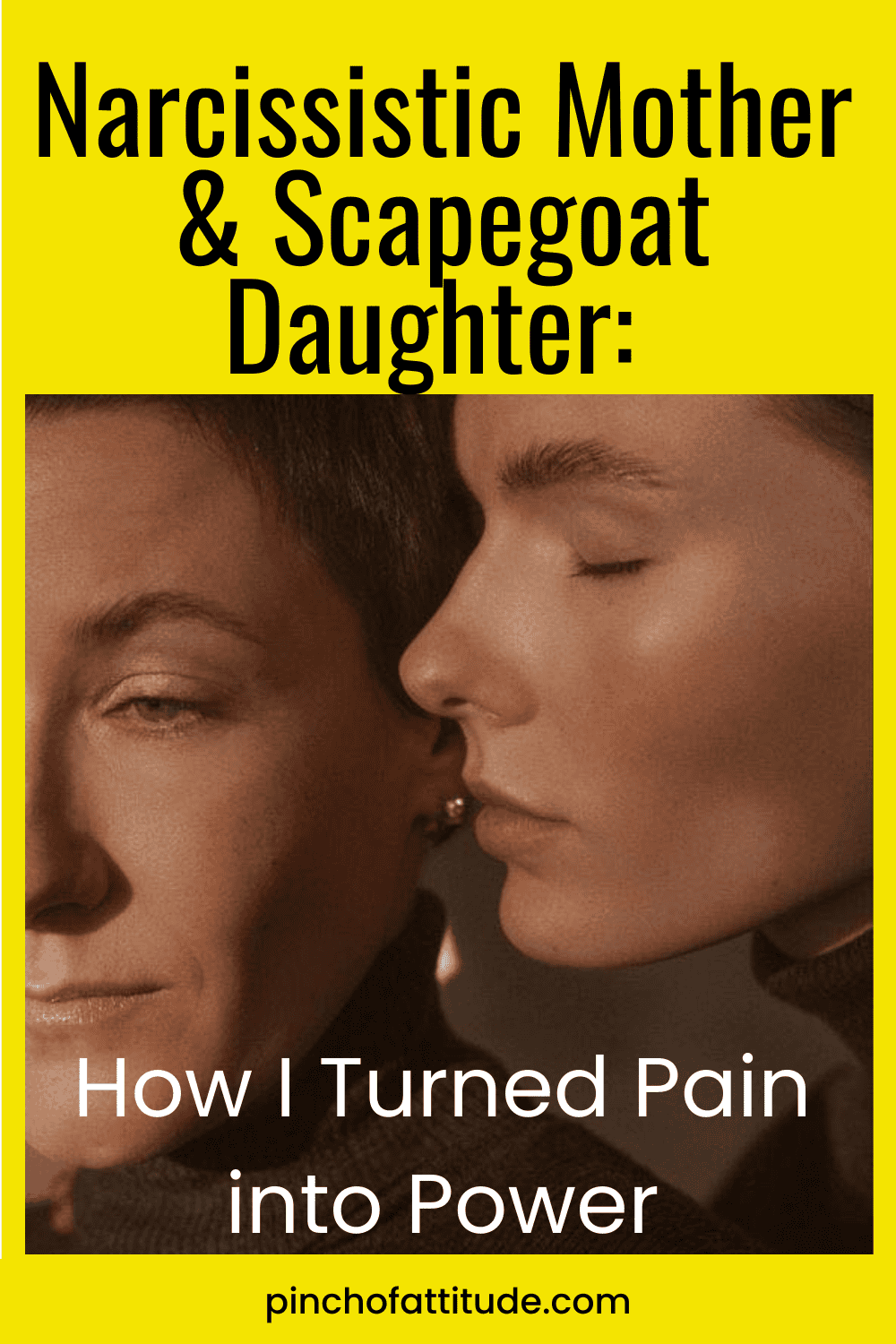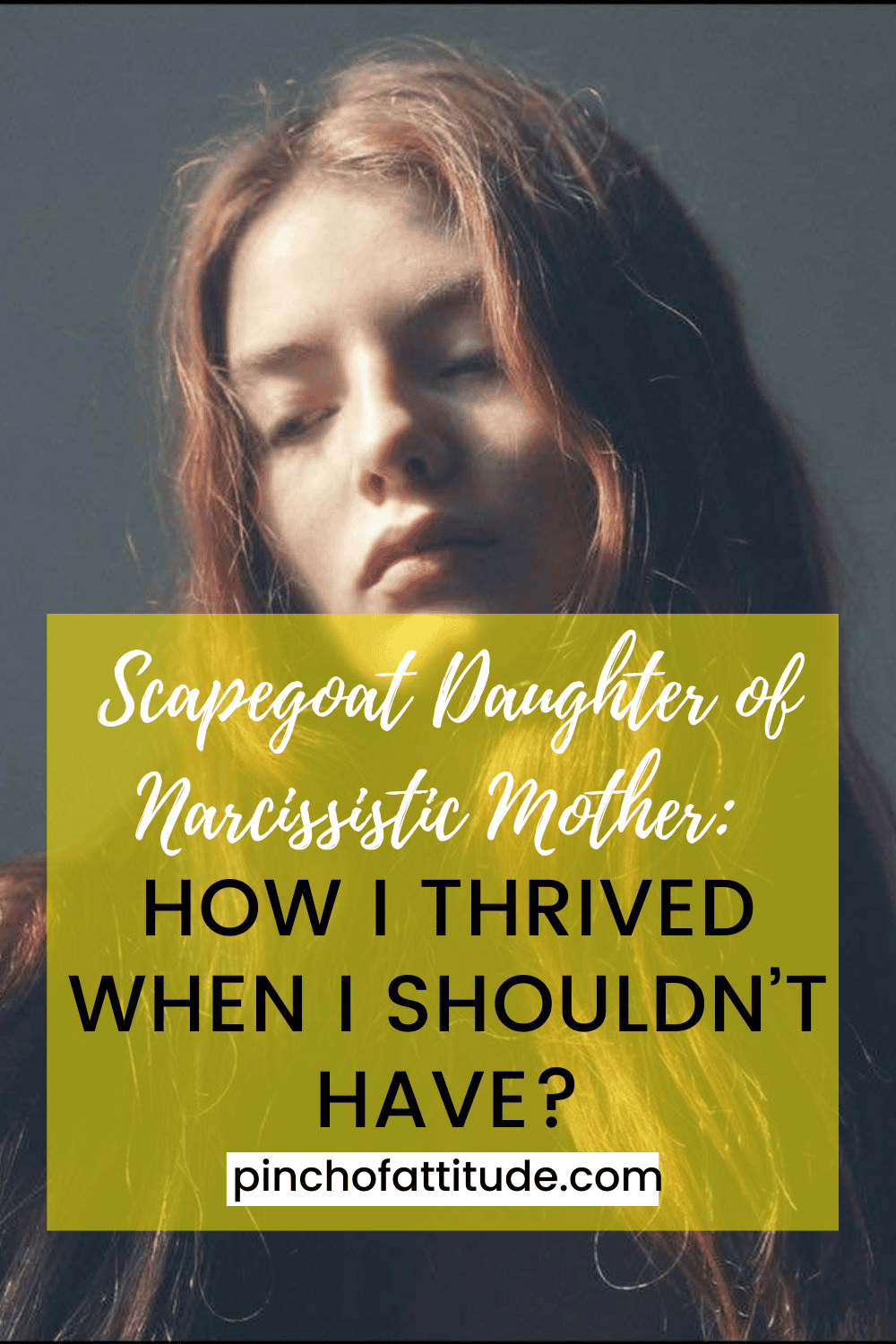Have you ever felt like you were living a never-ending game of emotional chess with someone who should have been nurturing and supportive?
That was my life growing up. I never asked to be the scapegoat daughter of a narcissistic mother, but that’s the role life dealt me.
I was the target of her relentless criticism and manipulation, and it felt like I was walking on eggshells, trying to earn her elusive approval.
Many might have predicted a life of struggle and self-doubt for me, but I chose a different path. Below, I’ll share how I not only survived but thrived despite the emotional minefield I grew up in.
This isn’t just my story. It’s for anyone who’s faced similar battles and still emerged stronger.
- Growing up with a narcissistic mother can lead to emotional turmoil, impacting your adult life outside the family.
- The scapegoat child’s role is not predetermined by birth order or gender, but by the narcissistic parent’s preferences.
- Scapegoated children develop various roles within the family dynamic, but understanding and setting boundaries are key to healing.
Table of Contents
What Is It Like Being a Scapegoat Daughter of a Narcissistic Mother?

Being a scapegoat daughter of a narc mother is like constantly walking through a minefield of emotional turmoil. As the designated family scapegoat, you bear the weight of blame for everything that goes wrong, while your narcissistic parent remains blameless.
Their insatiable need for validation and control makes you feel like you can never measure up, no matter how hard you try.
You feel guilty even when it’s undeserved, and your self-esteem takes a relentless beating as you struggle to find your own identity amidst the chaos.
Growing up a part of this toxic family system is a draining and challenging experience that can have lasting effects on your emotional well-being.
As an adult, these effects can manifest in a range of issues, from difficulties in forming healthy relationships to battling with anxiety, depression, and low self-worth.
The scars of narcissistic abuse often linger, but with the right support and self-discovery, there’s hope for healing and reclaiming your life.
The first step to breaking free from that role is to identify the patterns and behaviors that made you the family’s scapegoat in the first place.
Why Am I the Scapegoat of My Narcissist Mother?
You may be the scapegoat of your narcissistic mother because she has chosen to project her negative feelings, insecurities, and faults onto you as a way to maintain her self-image and control within the family.
This dynamic often serves the narcissistic parent’s need for dominance and can be a means of deflecting blame away from themselves onto a designated family member, in this case, you.
In a mother-daughter relationship, this often takes place as a result of complex dynamics.
The role of the scapegoat typically evolves through a combination of the following factors:
- Projection of insecurities: A narcissistic mother often has deep-seated insecurities and a fragile self-esteem. She may project her own negative feelings onto one of her children, often the daughter, so she can maintain a more positive self-image.
- Unmet expectations: A narc mother may have unrealistic expectations for her children, and when these are not met, she may place the blame on the designated scapegoat. This could include academic performance, career choices, or personal life decisions.
- Disobedience or independence: If the daughter displays independence, questions the mother’s authority, or challenges her behavior, the narcissistic mother may view this as a threat to her control.
- Emotional manipulation: A narcissistic mother employs emotional manipulation, such as guilt-tripping, gaslighting, or passive-aggressive behavior, to keep the scapegoated daughter in a subservient position.
- Sibling dynamics: In many cases, the role of the golden child, who receives preferential treatment and praise, is juxtaposed with that of the scapegoat. Sibling rivalry may cement these roles, with the scapegoat experiencing resentment from their siblings.
- Multigenerational patterns: Narcissism can sometimes be a generational issue, and the mother may have been a scapegoat herself in her own family. She might unconsciously replicate these dynamics in her relationship with her daughter.
As I reflect on my own story, it’s clear how these dynamics played out in my life. I bore the brunt of my mother’s criticism and manipulation, which led to feelings of guilt and a constant assault on my self-esteem.
The impact of this role didn’t just end in childhood. It persisted into my adult life. Yet, it’s also shaped me into someone who is authentic and unafraid to fail or try new things.
I’ve learned to adapt to difficult situations and build a strong foundation for decision-making, thanks to the experiences I’ve had.
To do the same, you first have to unravel the complex roles of the scapegoat daughter, understand how they influence your life, and find the strength to rewrite your own story.
Roles of Scapegoat Daughters in Narcissistic Families
Growing up as the scapegoat daughter of a narcissistic mother is a challenging and often emotionally taxing experience.
In this role, you find yourself shouldering a variety of responsibilities and expectations that are often unfair and detrimental to your well-being.
Based on my personal experience, below I break down the key roles played by the scapegoat daughter in this complex family dynamic:
1. The Blame Magnet
Being the scapegoat daughter in a narcissistic mother’s world often means you’re the designated blame magnet.
It’s like you have a bullseye on your back, and whenever something goes awry in the family, you’re the easy target.
Your mom’s blame and criticisms seem to land on you, whether it is a trivial issue or a major problem.
I constantly found myself in this role. It felt like I was responsible for everything that went wrong, no matter how hard I tried to avoid it.
I’d be blamed for arguments, for things breaking, for anything that didn’t meet my mom’s impossible standards. Arguing with her was emotionally exhausting.
To cope, I learned to detach from the blame, understanding that it wasn’t truly mine to carry.
It took time, but I realized that accepting undeserved blame wasn’t a requirement for love or self-worth.

2. The Family Whipping Post
Being the family whipping post is like being the emotional punching bag where all the frustrations and insecurities within the family are vented.
Your narcissistic mother may unleash her harshest criticism and manipulation on you, using you as a convenient target.
In our family, I got chosen for this role, constantly subjected to my mother’s verbal assaults.
It was emotionally draining, but over time, I learned to set boundaries and distance myself from her emotional ups and downs.
It wasn’t easy, but I asked myself, “Is it my responsibility to endure this treatment?” The answer was a resounding no, and it propelled me toward self-preservation and healing.

3. The Underachiever
The underachiever role is one that often plagues the scapegoat daughter.
In the eyes of a narcissistic mother, you’re consistently portrayed as falling short, no matter your actual accomplishments.
Your achievements are overshadowed by the golden child’s successes, and you are made to feel like you’re not good enough.
For a long time, I felt this label weighing me down. It seemed like my efforts were always downplayed or dismissed. And despite my accomplishments, I was consistently made to feel like I fell short.
To cope, I learned that my worth wasn’t defined by someone else’s unrealistic expectations. I started to set my own goals and achievements, and gradually, I gained confidence in my abilities.
It’s a tough role, but understanding this dynamic is the first step toward breaking free from it and forging your path to self-worth and accomplishment.

4. The Rebel

Within the scapegoat role, you often find yourself playing the rebel.
You don’t conform to the narcissist mother’s rigid expectations, dare to think differently, and don’t easily bend to her will.
Since the scapegoat has this defiance, often perceived as a threat by the narcissist parent, they are labeled as the bad child.
Being an explorer since I was young, I never fit the mold my narcissistic mother expected. This non-conformity led to friction and criticism, but it also nurtured my authenticity.
Over time, I realized that being the “rebel” wasn’t a flaw. It was a sign of resilience and strength.
Think about it. Is it better to conform and sacrifice who we are, or embrace our individuality and stand true to ourselves?

5. The Source of Guilt
A scapegoated child may find themselves burdened with this role.
It’s as if the weight of the world’s wrongdoing rests on your shoulders, and you’re made to feel guilty for every problem.
The narcissist parent may skillfully manipulate your emotions, making you believe you’re the cause of family strife and suffering.
In my life, guilt became a constant companion, even for things I had no control over. To cope, I gradually distanced myself from the narcissistic abuser.
I learned that my happiness and well-being were essential, and it wasn’t my responsibility to carry unwarranted guilt.

6. The Truth-Teller
One role that often emerges in the lives of adult children of narcissistic parents is that of “the truth-teller.”
You probably have this uncanny ability to see through the family’s dysfunction and grasp the reality of the situation.
You may be the one who validates the experiences of others while also shedding light on the toxic dynamics at play.
Scapegoated children develop an acute ability to validate what’s real, even when others may deny it.
While it was often overwhelming, this role gave me a deeper understanding of the family dynamics.
I could see through the lies and manipulation, which, in turn, allowed me to break free and recover from narcissistic abuse.
It’s not always easy, but I learned that being true to myself could lead to healing, not just for myself but for others as well.

My Story of Being a Scapegoat Daughter Raised by My Narcissistic Mother
Growing up with a narcissistic mother is a journey filled with challenges and complexities.
Her narcissistic personality disorder cast a shadow over my childhood, and I often found myself in the unfortunate role of the scapegoat in the family dynamics.
From a young age, I recall my mother’s constant need for attention and admiration.
She would often belittle my accomplishments, saying things like, “That’s nice, but it’s not as impressive as your sister’s.”
This form of abuse, emotional and psychological, became the norm in our household.
My mother’s manipulation knew no bounds.
She played mind games, pitting my siblings against me, favoring my sister as the golden child, and leaving me to grapple with feelings of inadequacy.
I remember her saying, “Why can’t you be more like your sister?” These words cut deep and left lasting scars.
It’s like constantly walking on eggshells, fearing her wrath at every turn. I was always made to feel like I was at fault for the family’s problems.
She’d often say, “You’re the cause of our unhappiness.” It was emotionally exhausting, and I struggled to find my own identity amidst the chaos.
But as I grew older, I began to see through the manipulation and control. I realized that I deserved better and that my self-worth was not determined by her unrealistic expectations.
My journey to recovery from narcissistic abuse was a transformative one. I sought therapy, built a support system outside of my family, and slowly but surely, I reclaimed my life.
Breaking free from the grip of narcissistic abuse has changed my life, allowing me to step into a brighter, more authentic future.
The scars remain, but they no longer define me.
Related Posts:
- Daughter of a Narcissistic Mother: How I Rise Beyond Trauma
- 13 Challenges I Had to Overcome While Growing Up With a Narcissistic Mother
- When the Scapegoat Fights Back: I Wasn’t Born to be a Pushover!
- How to Stop Being the Scapegoat: In Family, Relationships & Adulthood
- How to Heal After Being the Scapegoat of the Family? My Side of the Story
Frequently Asked Questions
What happens to daughters of narcissistic mothers?
Daughters of narcissistic mothers often face struggles outside of their family due to the abuse they endured growing up.
Which child is usually the scapegoat?
The role of scapegoat can be assigned to any child in a narcissistic family, often based on who challenges the narcissistic parent or doesn’t conform to their expectations.
How does a narcissist treat a scapegoat child?
A narcissist typically treats a scapegoat child with blame, criticism, and emotional manipulation, while favoring the rest of the family.
Why don’t narcissistic mothers love their daughters?
Narcissistic mothers may struggle to love their daughters because their primary focus is on their own needs and desires. This makes it difficult for them to raise a child with genuine love and care.
Why are narcissistic mothers jealous of their daughters?
Narcissistic mothers can be jealous of their daughters due to feelings of competition or insecurity. Their daughters may represent qualities or opportunities they lack.




